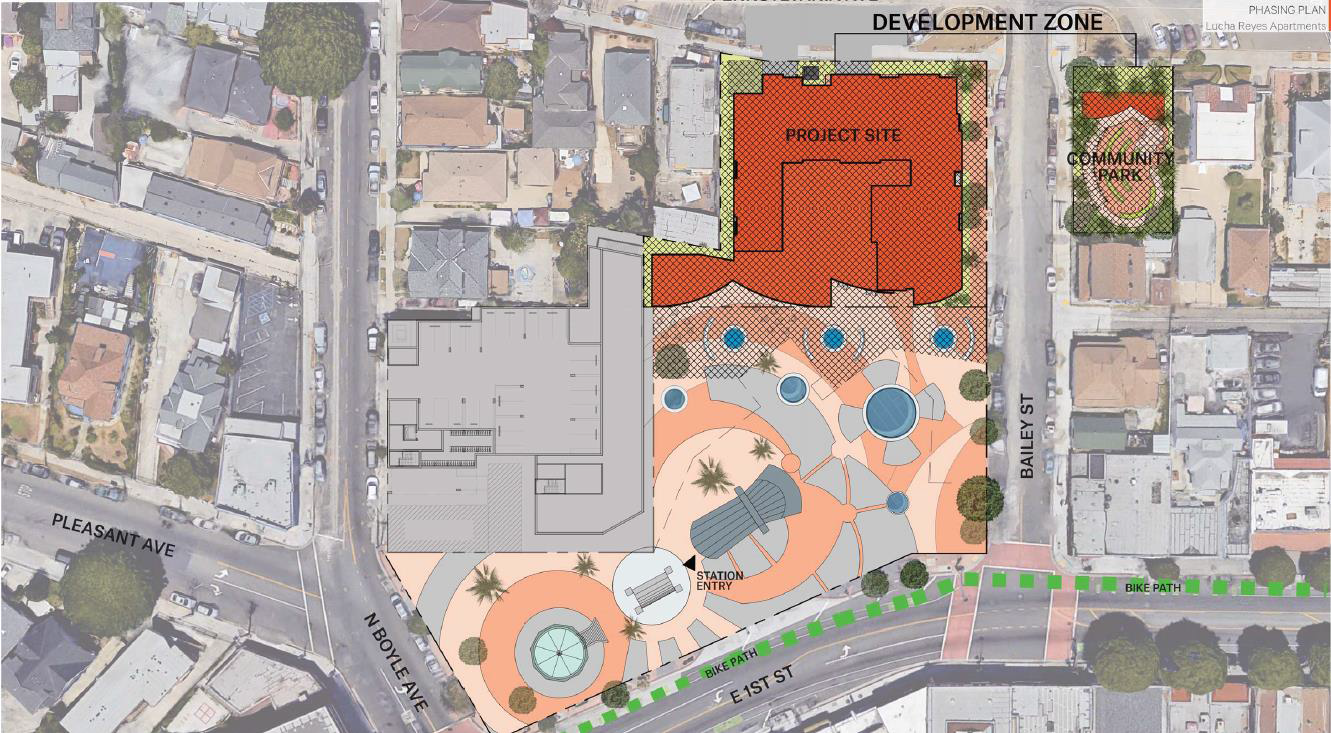On the agenda at Metro's Planning and Programming Committee for Wednesday, January 17, is the approval of an 18-month Exclusive Negotiation Agreement (ENA) with the East L.A. Community Corporation (ELACC) and Abode Communities in support of their proposals for mixed-use affordable housing and retail (including a grocery) projects for Metro-owned lots at Mariachi Plaza and Cesar Chavez/Fickett.
Mariachi Plaza: The Lucha Reyes Apartments
The proposed project for Mariachi Plaza - named for late Mexican Mariachi star Lucha Reyes - includes 60 units of affordable housing, 30 of which will be set aside for those earning 30 percent of Area Median Income (AMI). Another 28 units will be reserved for those earning 50 percent AMI, and the last two will be managers' units. Nearly half the units (26) are proposed as zero-bedroom (studios), 19 will be one-bedroom, and the rest will be divided between two- and three-bedrooms.
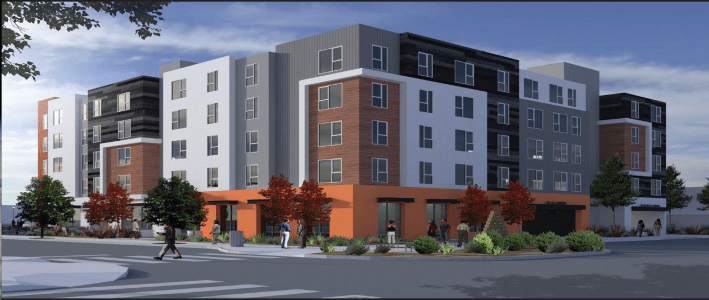
It's a configuration that seems aimed at keeping rents low and suggests ELACC is looking to help house some of the mariachis that are currently struggling to retain their foothold around the plaza that bears their name. Just a block away, at 1815 E. 2nd Street, mariachis continue to struggle against exorbitant rent hikes at the building new owner Frank "BJ" Turner has rechristened "Mariachi Crossing." [They were in court again just a few days ago, but the judge has postponed ruling on the case as of this posting.] Other mariachis in the area have also complained of rising rents, intimidation from landlords, and no alternatives nearby with comparable rents and easy access to the plaza where they get their jobs.
ELACC's proposal also includes 6,340 square feet of retail and dining spaces, 2,035 square feet for a Mariachi Cultural Center reserved for the Organización de Mariachis Unidos de Los Angeles (OMULA), 54 on-site parking spaces (11 of which are intended to help serve local businesses along 1st Street), 84 bicycle spaces, and a 6,000 square foot park and community garden on the southeast corner of Bailey and Pennsylvania to be operated by CALÓ YouthBuild. ELACC will be working with both CALÓ YouthBuild and Jovenes, Inc., two local community-based organizations with a history of serving youth in the area, to provide services and community programming.
The proposal is one of two Metro received for the site. The other came from the Cesar Chavez Foundation and included 80 units of affordable housing and 8,500 square feet for a cultural center. But with only ten percent of the units being reserved for those earning 30 percent AMI and nearly half going to those making 60 percent AMI, the bulk of the units would likely have been out of reach of too many in the community. [See the comparison of the proposals here.]
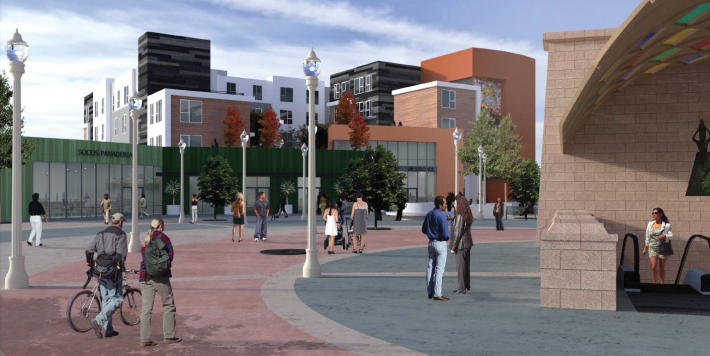
From the view above, looking northeast from the Metro station entrance, a jumble of residences appear to rise behind low-slung spaces that could potentially house a panadería and other community-serving eateries and shops.
Looking northwest(ish), the rendering below reiterates the project will not tower over the plaza and will instead help maintain its character as an open and airy space for the many community gatherings and festivals it hosts.
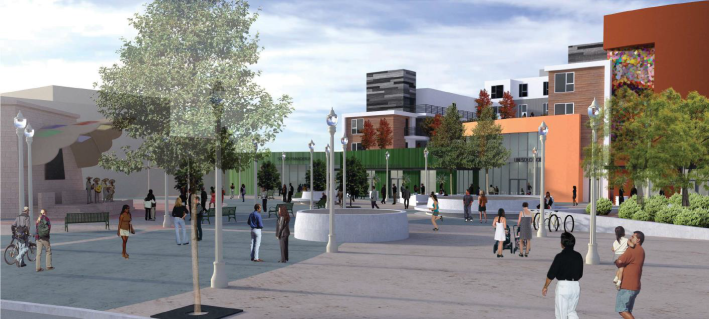
The renderings [found here] do not offer a detailed picture of the retail or park spaces just yet. Proposed retail and dining spaces appear to match the height - although not the style - of the buildings adjacent to the lots, which are privately owned and currently up for sale.
The announcement of Metro's preferred projects, coming late in the day Friday, marks the beginning of the end of Metro's three-year effort to make amends for the firestorm it touched off at the end of 2014, when it attempted to push through a proposal that appeared to erase all traces of the very people and culture Mariachi Plaza celebrated (below).
That reality is also what makes it so fitting that both ELACC and CALÓ Youthbuild will be the ones to give the lots new life - both were instrumental in pushing back against Metro's original project, winning more time for community engagement around the development guidelines for the site, and organizing residents and youth to ensure their voices were represented.
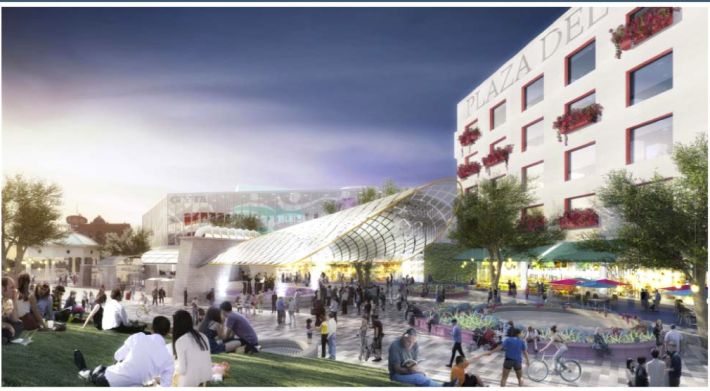
Cesar Chavez/Fickett: The Chavez Gardens
Metro had to relaunch the engagement process around the site at Cesar Chavez and Fickett as part of the fallout from the uproar over Mariachi Plaza. But the site had been plagued by other delays, as well.
In 2004, a developer proposed affordable housing for the site, but then backed away from the project. Several years later, McCormack Baron Salazar (MBS) proposed foregoing affordable housing in favor of giving the community the grocery store it had long been clamoring for (to replace a market lost when the Gold Line was built). For largely technical reasons, Metro ended up backing away from that proposal at the end of 2015, rescinding the ENA it had approved with MBS and restarting the community engagement process around neighbors' vision for the site in 2016. [See more details here.]
In early 2017, Metro sent out the request for proposals seeking a developer who could find a way to provide both housing and the vital services area residents demanded.
Abode Communities' proposal for 60 units of affordable housing, 25,000 square feet of retail/grocery space, 6,000 square feet for a community park, 82 parking spaces, and 95 spaces beat out four other proposals. [See the procurement summary comparing them here]
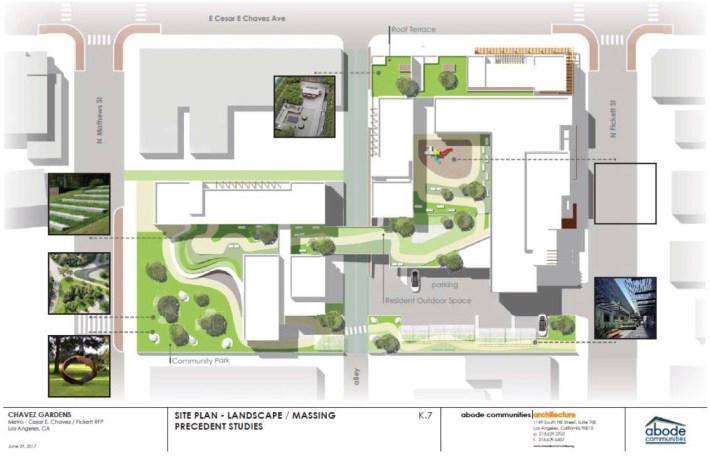
According to Metro's report, Abode's proposal is the most successful in adhering to the guidelines for the development of the site, offering all units between 30 and 50 percent AMI, the desired grocery, and a park that is accessible to the community. Although the size of the grocery will mean that there will be no space for a designated community room, 2,700 square feet of meeting space will be made available to the community for gatherings.
The "East Gardens" building (at right) will be home to 40 residences, the grocery store, and parking. The "West Gardens" (at left) will be home to 20 residences, the park, and parking. An elevated pedestrian bridge will link the two buildings. The design is somewhat open to allow the community easy access to the park and other services from the street.
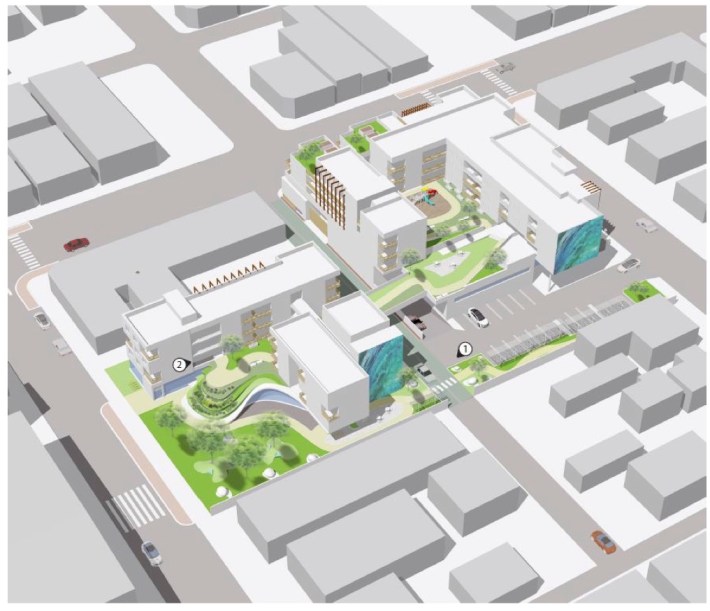
The make-up of the residences is significantly different than that proposed by ELACC for Mariachi Plaza.
The bulk of the apartments are reserved for those making 50 percent of AMI (41), while only 12 will go to those at 30 percent AMI. The apartments will also be larger, with half consisting of two-bedrooms and the other half being split between one- and three-bedrooms.
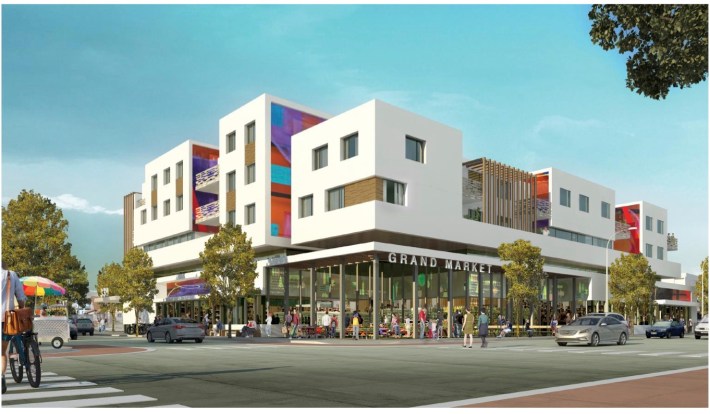
From the limited details included in the procurement document, it is not immediately clear why Abode's proposal won out over those that proposed greater density (LINC proposed 101 units, while another developer proposed 87). But according to Metro's checklists, Abode's project was far and above the best designed and most financially sound, and their team was the most experienced with the greatest capacity for implementation and follow through. Abode also has a solid track record of implementing affordable housing projects throughout Los Angeles, including helping wrest the Rolland Curtis Gardens (at Expo/Vermont) from billionaire developer Jeff Greene and safeguard the site for low-income families.
Metro does, however, encourage Abode to build partnerships with local community-based organizations. Currently, their only local CBO partner is the Los Angeles Neighborhood Initiative (LANI).
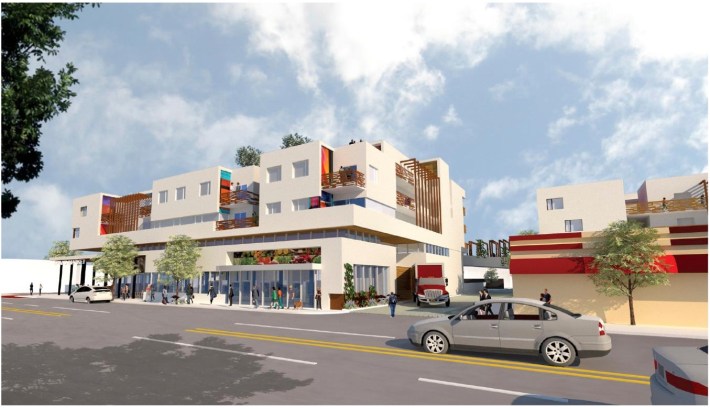
Metro is able to ask that proposals and processes adhere to those outlined in the development guidelines for each site (found here and here) because it retains ownership of the lots, leasing them to the developers as part of its Joint Development program. The Metro Board of Directors will consider the recommendations for approval of the ENAs at the Planning and Programming Committee on January 17, 2018, at 2 p.m. and at the full Board meeting on Thursday, January 25, at 9 a.m. at One Gateway Plaza in the Metro Board Room, 3rd Floor. The ENAs give developers 18 months to continue engaging neighbors and refining their proposals while completing the planning, design, and entitlement work necessary to meet CEQA guidelines and negotiating key terms and conditions to be included in a joint development agreement and ground lease with Metro. At the end of that 18-month period, Metro staff report back to the Board before the project gets final approval.
ELACC invites residents to rally at Metro in support of the project just before the meeting begins on the 17th.
Our previous coverage of Metro's interactions with the community around the fate of Metro-owned lots:
- January, 2017: Metro Committee to Adopt Mariachi Plaza Development Guidelines Wednesday
- March, 2016: Residents Debate Priorities for Mariachi Plaza at Second Design Workshop
- March, 2016: Planning for Mariachi Plaza Begins Again; How it Will Tie in to Other Area Projects Remains Unclear
- December, 2015: Metro Moves Affordable Housing Projects in Boyle Heights Forward, Returns Grocery Store Project to Drawing Board
- October, 2015: Boyle Heights to See Improvements in Phase Two of the Eastside Access Project
- August, 2015: Privileging Form (and Speedy Implementation) over Function Yields Semi-Obsolete Street Furniture in Boyle Heights
- March, 2015: Boyle Heights Youth Research Community Challenges, Find Proposed TOD Solutions Don’t Go Far Enough to Help Neediest
- January, 2015: Youth Rise Above Heckling to Win Concession for Community on Metro Projects at Neighborhood Council Meeting
- January, 2015: Finally Given a Platform, Boyle Heights Speaks Out on Metro’s Mariachi Plaza and Affordable Housing Plans
- November, 2014: Metro Postpones Approving ENA for Mariachi Plaza, Gets Blasted for Having it on Agenda in First Place
- November, 2014: Dupont-Walker, Community Press Metro on Surprising Changes Slated for Mariachi Plaza, Demand More Outreach
- September, 2013: Eastside Access Project Takes Another Step Forward, Experiences Growing Pains
- February, 2013: Developers Introduced at Metro Open House to Reshape Empty Lots
- December, 2012: “Starting from the Beginning” for Some Metro Owned Sites in Boyle Heights
- December, 2012: Boyle Heights Community, Metro Clash at Meeting Over Development at MTA Owned Property
